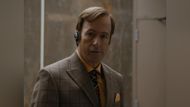Better Call Saul is a genre-bending prequel-sequel mashup of Breaking Bad. As you watch it, you are immediately transported to an ultra-detailed Albuquerque that feels lived-in. It’s drama, but it’s also a wink at real lawyering, complete with all the specific local flavor.
What makes it cool is that the events in Better Call Saul are what might be holding together the Breaking Bad universe. You thought you knew Saul Goodman? The show peels back the layers—Jimmy McGill, the desperate hustler, the ethical wreck, the guy whose life is one long bad decision. And it doesn’t just fill in the blanks for him; it incorporates stories and characters from both shows in ways that are genius. Especially in the last season, when they just go for it—crashing Walter White and Jesse back into the picture, rewiring everything you thought you knew.
Timeline-wise, Better Call Saul features flashbacks, flash-forwards, present day, all smashed into one big narrative. You get to see Jimmy’s slow-motion trainwreck of a transformation, plus all the gritty stuff about crime, lawyers, and power games in the Southwest. The show’s creators, Vince Gilligan and Peter Gould, obsess over every detail—fictional drama stitched together with real bits of law and American life.
And, of course, everyone’s got that question: Is Saul Goodman a real guy? Is this all based on some true story? Where’d this character even come from? The show blurs the line between reality and fiction on purpose, as it is packed with nods to real lawyers, the absurdity of the American legal system, and all the stuff that goes down in courtrooms across the country. Saul embodies the sketchy lawyer trope, but there’s heart and sharp social commentary in there, too.
So, if you’re digging for answers, buckle up. We’re diving deep. Because Better Call Saul isn’t just TV; it’s a mirror for the broken, fascinating world of American justice.
The creation of Saul Goodman in Better Call Saul: Fictional character, real-world roots

Meet Saul Goodman. Well, technically, he’s a brainchild of Vince Gilligan and Peter Gould, created for Breaking Bad. You know, that guy with the crazy suits and the Better Call Saul! schtick? He’s the kind of lawyer who’d probably hand you a business card at your own funeral. He’s there to make you laugh when things get too heavy, but also to grease the plot wheels whenever the show needs to get shadier. They didn’t just make him flashy for fun. He is a walking, talking roast of legal ads you see around. Or, anytime you drive past a billboard in the U.S.
The name “Saul Goodman” is a pun (“It’s all good, man!”). But it also fits, as it is comforting and slimy, all at once. And those ads (cheesy commercials, way-too-bright office, big smile), it’s satire, but it’s also way too real.
So, Saul is not exactly just fiction. The creators lifted his personality from Ron Bell, a real Albuquerque lawyer famous for loud, goofy ads and in-your-face billboards. If you’ve ever seen a lawyer commercial that made you cringe and laugh at the same time, you get the idea. Robb Wilson King, who designed sets for the show, even said meeting Bell was like stepping into the show itself—props, oversized desks, and more. Bell’s thing was to be loud, memorable, and make people think that maybe he’s the person who can help me.
It’s not just a New Mexico thing. Ever since lawyers were allowed to advertise in the ‘70s, the whole profession has gone a little off the rails with slogans, corny jokes, and lots of promises to fight for “the little guy.” All that gets baked straight into Saul’s DNA.
So, Saul was made to come to life through a mix of real lawyers, legal TV tropes, and a lot of satire. He’s fiction, but he’s also the most real thing about late-night TV.
Meanwhile, the idea of “hustler lawyer” is a classic. Saul is right in the middle of a long line of TV and movie lawyers—some noble, some scummy, some just out there chasing ambulances. Better Call Saul isn’t just making fun of lawyers; they’re poking at a whole culture where justice is a performance, and winning is everything.
The rise (and fall) of Jimmy McGill, aka Saul Goodman

Saul Goodman didn’t just pop out of the ground in a cheap suit. He started as Jimmy McGill—a broke, scrappy public defender with a knack for talking his way out of trouble. Better Call Saul depicts the falling apart of Jimmy’s life, showing how a guy with some good in him can slide, inch by inch, into full-on sleaze territory. It’s not one big moment; it keeps creeping up.
All this has roots in real life, too. There are plenty of lawyers who’ve started out wanting to help people, then wound up bending the rules till they snap. Legal dramas love this stuff, but Better Call Saul nails how messy and sad that road can be.
So is he inspired by real messes in American law? The answer is no, Jimmy is not based on just one guy, but his story is patched together from all sorts of real legal scandals—lawyers who fudged the rules, got desperate, or just couldn’t keep up with the bills. The show delves into the less glamorous aspects of the profession: public defenders struggling with debt, the relentless “win at all costs” mentality, and the dual life some lawyers ultimately lead.
Bottom line is that Jimmy/Saul isn’t just a character. He’s a warning, a punchline, and a relatable man all at once. And that’s why he works; he has got one foot in TV land, and the other stuck somewhere in real-life Albuquerque, right next to a garish billboard.
Saul Goodman as social commentary: Ethics, advertising, and identity

Saul Goodman is the legal world’s answer to a used car salesman with a flair for polyester suits. After the Supreme Court gave lawyers the green light to advertise back in ’77 (Bates v. State Bar of Arizona), it was open season for cheesy billboards and late-night “Have you been injured?” commercials. Saul is like the walking, talking, exaggerated version of all that. Critics have pointed out how Saul’s whole shtick is a funhouse mirror for all the sketchy stuff that came out once lawyers could start selling themselves.
And then there’s identity. Saul Goodman isn’t just a name—it’s Jimmy McGill’s alter ego, his emotional hazmat suit. People have written essays about how this “mask” idea perfectly sums up that American obsession with reinventing yourself, even if it means losing track of who you actually are.
Law schools reportedly regularly use clips from Better Call Saul to get students arguing about what counts as “crossing the line" regarding ethics. Jimmy’s slow-motion nosedive from earnest striver to moral trainwreck gets used as a case study—like, at what point does a good person finally cross the line? It’s usually a mix of being broke, feeling invisible, and seeing an easy (but dirty) way out.
A 2020 survey in the Journal of Legal Education showed that more than 50 law schools use Better Call Saul episodes in their ethics classes. Professors are assigning scenes like the Slippin’ Jimmy episode to show students what fraud and screwing over your clients really looks like.
In conclusion, Saul Goodman is a fictional character with real-life inspirations. He’s not secretly some real Albuquerque lawyer running cheesy TV ads or hustling clients. Sure, the writers grabbed bits and pieces from those over-the-top local attorneys, but it’s not like Saul’s life story is ripped from anybody’s diary. Saul Goodman is what you get when the American Dream gets a little too hopped up on late-night infomercials and moral compromise.
